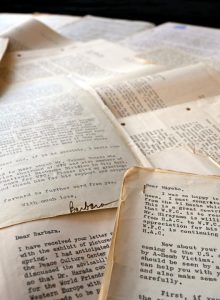Traces of ideas to “testify about A-bombed city of Hiroshima” — Writings between Japan and US, Miyoko Matsubara and Barbara Reynolds discovered
Jul. 24, 2023
by Hiromi Morita, Staff Writer
A large number of letters exchanged by the late Miyoko Matsubara, an A-bomb survivor who suffered severe burns on her face and body in the atomic bombing, and the late Barbara Reynolds, founder of the World Friendship Center (WFC), have been discovered at the WFC offices, located in Hiroshima’s Nishi Ward. Ms. Matsubara, who worked to communicate her A-bomb experience to the public in Japan and overseas, sent letters to Ms. Reynolds after Ms. Reynolds returned to the United States, aiming at implementation of the Hiroshima for Antinuke Peace Caravan, a group that traveled across the United States in 1982. The newly found letters provide insight into Ms. Matsubara’s reflections about how to communicate the atomic bombing to audiences in the United States.
The letters were found in files that had been stored in cardboard boxes. They appeared to be part of the two women’s personal correspondences exchanged during the period 1979–1982. The materials include Mr. Matsubara’s translations into Japanese and drafts of her own letters, both of which are thought to have served as reports for people involved in the project.
Ms. Matsubara was dispatched to the United States by the Hiroshima Appeal Committee (HAC), a group that continued such work as sending A-bomb-related writings from the A-bombed city to the Peace Resource Center (PRC) at Wilmington College in the United States. The HAC seems to have launched the caravan project in an attempt to heighten public opinion against nuclear weapons in the run-up to the United Nations Second Special Session on Disarmament, held in New York in the same year, 1982.
Ms. Matsubara participated in the World Peace Pilgrimage, a project originally proposed by Ms. Reynolds in 1962 and 1964. Ms. Matsubara was working in the offices of HAC and frequently exchanged letters with Ms. Reynolds, even after Ms. Reynolds returned to the United Sates. Learning of Ms. Matsubara’s plans to visit the United States, Ms. Reynolds welcomed the news as being “very important.” At the same time, Ms. Reynolds emphasized that “it is important to understand the feelings of Americans today.” Explaining that hibakusha (A-bomb survivors) living in the United States and people exposed to radiation from U.S. nuclear testing were struggling to gain government support, Ms. Reynolds warned in a letter that such people “might be upset if you come to talk only about Japanese hibakusha.”
The WFC, which took over the work of the HAC after that committee’s dissolution, uncovered the letters when its staff engaged in organizing archived materials involving the HAC. The organization will continue to examine and analyze the letters, based on the consideration that “a lot of things could be understood from the materials,” including about the process leading to establishment of the peace caravan.
(Originally published on July 24, 2023)
A large number of letters exchanged by the late Miyoko Matsubara, an A-bomb survivor who suffered severe burns on her face and body in the atomic bombing, and the late Barbara Reynolds, founder of the World Friendship Center (WFC), have been discovered at the WFC offices, located in Hiroshima’s Nishi Ward. Ms. Matsubara, who worked to communicate her A-bomb experience to the public in Japan and overseas, sent letters to Ms. Reynolds after Ms. Reynolds returned to the United States, aiming at implementation of the Hiroshima for Antinuke Peace Caravan, a group that traveled across the United States in 1982. The newly found letters provide insight into Ms. Matsubara’s reflections about how to communicate the atomic bombing to audiences in the United States.
The letters were found in files that had been stored in cardboard boxes. They appeared to be part of the two women’s personal correspondences exchanged during the period 1979–1982. The materials include Mr. Matsubara’s translations into Japanese and drafts of her own letters, both of which are thought to have served as reports for people involved in the project.
Ms. Matsubara was dispatched to the United States by the Hiroshima Appeal Committee (HAC), a group that continued such work as sending A-bomb-related writings from the A-bombed city to the Peace Resource Center (PRC) at Wilmington College in the United States. The HAC seems to have launched the caravan project in an attempt to heighten public opinion against nuclear weapons in the run-up to the United Nations Second Special Session on Disarmament, held in New York in the same year, 1982.
Ms. Matsubara participated in the World Peace Pilgrimage, a project originally proposed by Ms. Reynolds in 1962 and 1964. Ms. Matsubara was working in the offices of HAC and frequently exchanged letters with Ms. Reynolds, even after Ms. Reynolds returned to the United Sates. Learning of Ms. Matsubara’s plans to visit the United States, Ms. Reynolds welcomed the news as being “very important.” At the same time, Ms. Reynolds emphasized that “it is important to understand the feelings of Americans today.” Explaining that hibakusha (A-bomb survivors) living in the United States and people exposed to radiation from U.S. nuclear testing were struggling to gain government support, Ms. Reynolds warned in a letter that such people “might be upset if you come to talk only about Japanese hibakusha.”
The WFC, which took over the work of the HAC after that committee’s dissolution, uncovered the letters when its staff engaged in organizing archived materials involving the HAC. The organization will continue to examine and analyze the letters, based on the consideration that “a lot of things could be understood from the materials,” including about the process leading to establishment of the peace caravan.
(Originally published on July 24, 2023)








